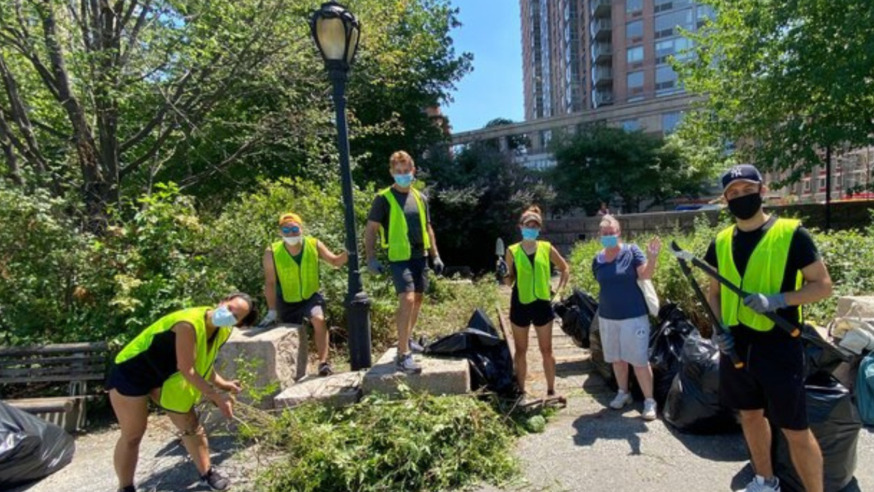
HPPC volunteers (HPPC Facebook page)
Nov. 19, 2020 By Michael Dorgan
The Hunters Point Parks Conservancy has overcome a roller-coaster year of setbacks and milestones to finish 2020 off on a high.
The voluntary group, which helps with the upkeep of Hunters Point South Park and Gantry Plaza State Park, faced unprecedented challenges this year as record numbers of people flocked to the parks while financial resources earmarked to maintain the parks were slashed due to the budget crisis.
During the peak summer months, the influx of people to both parks generated piles of trash while an uptick in anti-social behavior wreaked havoc. The conservancy also had to contend with its outdoor programming being scrapped – which consists of events like movie nights and fitness classes – as gatherings were not permitted due to COVID-19.
Nevertheless, the conservancy adapted to those obstacles and redoubled its efforts to help maintain both parks. The organization purchased smart garbage bins to combat trash; advocated for the repair of broken lights; identified and helped clear graffiti; planted a new garden to beautify the area; held 50 volunteer days for gardening and cleanups; planted thousands of bulbs and removed hundreds of bags of weeds.
The conservancy was also in regular communication with elected officials, took its popular outdoor events online, and even launched an education program with local schools.
Rob Basch, president of Hunters Point Parks Conservancy, said he was proud of the group’s accomplishments given what New Yorkers have had to contend with in 2020.
He said public parks are now more important than ever since indoor events are restricted due to COVID-19.
“Parks have never been more essential to the health of a community and the conservancy is proud of what we have been able to accomplish despite a pandemic,” Basch said. “We will work tirelessly to keep the parks clean, safe and welcoming for all.”
The conservancy was put to the test particularly over the summer months when large numbers of people visited both parks–and the parks were often trashed.
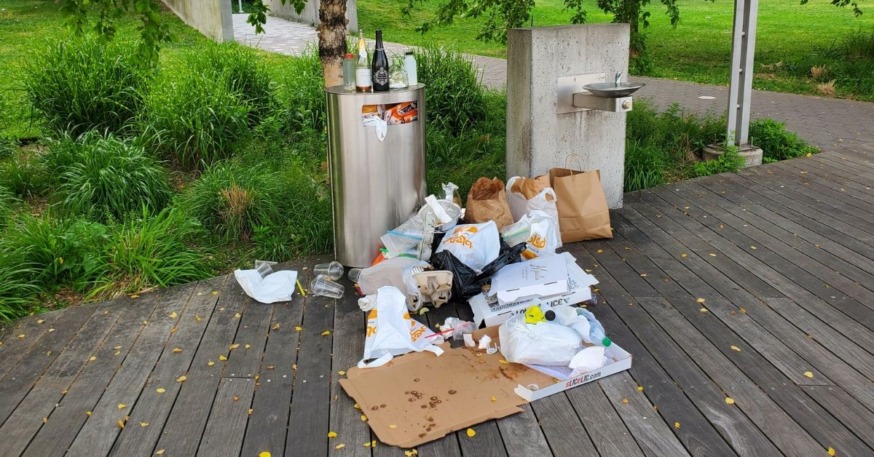
Gantry Plaza State Park and Hunter’s Point South Park have witnessed high levels of trash (Facebook).
Garbage was often strewn across the parks; empty liquor bottles were dumped on benches; the parks were tagged with graffiti; and large patches of grass were burned by illegal fireworks.
The litter problem was also exacerbated by more food trucks operating in the area. Furthermore, the city also pulled its regular allowance of seasonal workers due to budget constraints.
The conversancy however tackled each problem one by one.
In July, the HPPC purchased and installed seven new Bigbelly garbage cans at Hunters Point South Park to tackle the litter problem;
Basch said that the investment in the Bigbelly garbage cans soon paid off. The cans have collected nearly 54,000 gallons of trash since going into operation.
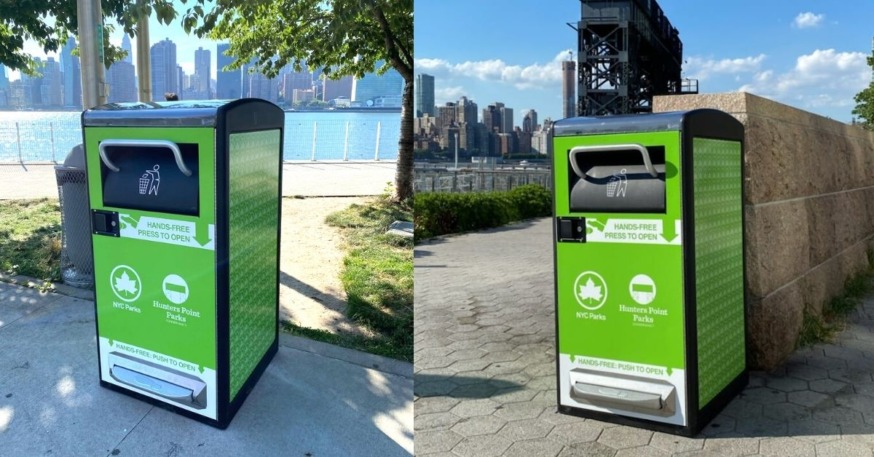
Bigbelly trash cans: northwest of the oval green (L) and on Center Blvd between 50th and 51st Avenue (R) (Images provided by Mark Christie).
Basch said that the conservancy worked regularly with state and city park workers over the summer to combat some of the vandalism that took place.
The HPPC, he said, identified more than 20 sites that were hit by graffiti in Hunters Point Park South and worked with NYC Parks to have them cleaned. It also identified areas damaged by illegal fireworks and joined with city workers to have them repaired.
“We are fortunate to interact with many dedicated city and state park workers that worked extremely hard to keep our parks welcoming for all,” Basch said.
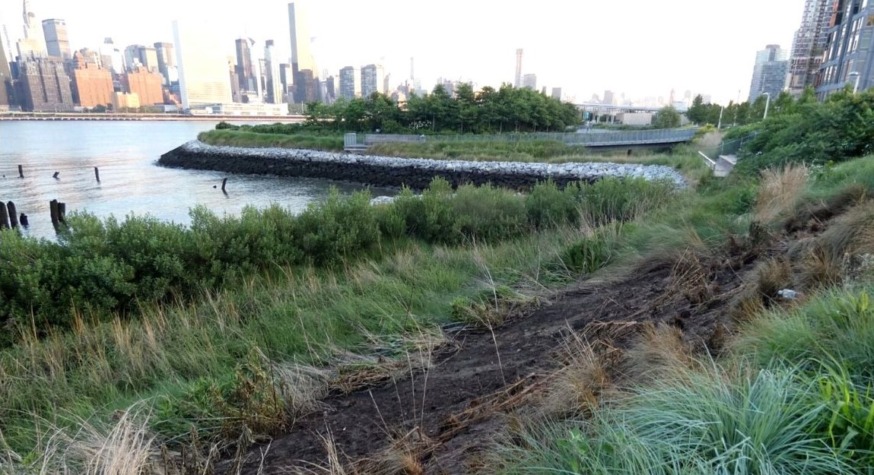
Burned grass at Hunters Point (Photo provided by Mark Christie).
The conservancy also addressed safety concerns by advocating for the lights in both parks to be repaired.
The lights in Hunters Point South Park were fixed, which included the 13 lights that surround the oval as well several lights by the benches in the new section of the park (Phase 2).
Progress is also being made on fixing the lights at Gantry Plaza State Park, where most no longer work due to wiring issues stemming from Superstorm Sandy in 2012. The state announced that it is working on a new project to fix them and Congresswoman Carolyn Maloney said she will be working with the conservancy to see this project through.
Basch said he was particularly pleased with the amount of programming the conservancy was able to deliver to residents, despite restrictions.
In a typical year, the conservancy puts on around 165 outdoor events that include outdoor movie screenings at the oval, yoga and Zumba class classes for adults, art classes and puppet shows for children.
“We were thrilled to provide a wide assortment of programming which consisted of 100 virtual events that had over 3,500 attendees,” he said.
All of the HPPC’s online events were free to attend despite the conservancy’s main fundraiser – the LIC Post 5K Waterfront Run – also being pushed online. The run makes up 40 percent of the conservancy’s annual unrestricted funds and the virtual run only brought in a fraction of that amount, Basch said.
Notwithstanding the setbacks, the conservancy managed to have a banner year.
The group held 50 volunteer days – it’s most ever – and its annual bulb fest event on Oct. 31 was attended by more than 70 people, Basch said.
During the volunteer days, the conservancy planted a record 13,000 bulbs, 1,300 plants and removed more than 850 bags of weeds.
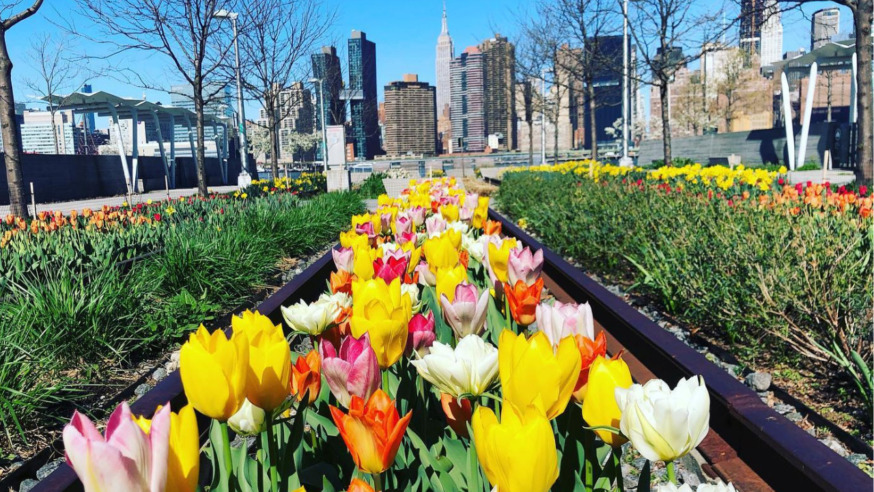
Flowers at the Hunters Point South Park (HPPC Facebook page).
The conservancy also partnered with the Newtown Creek Alliance in September to create a pollinator garden on 48th Avenue. The garden will be used as a teaching tool for local students to study the ecology of Newtown Creek thanks to a special curriculum the conservancy helped produce.
The HPPC has now wrapped up its work for the year, with its final volunteer day taking place on Nov. 7. Basch said the conservancy will reconvene again in the spring.
The most pressing issue for next year remains city and state budget cuts but the HPPC says it will continue to work hard to make up for some of the shortfalls, Basch said.
“The conservancy recognizes the challenges to city and state park budgets and we will continue to raise funds to help supplement the parks’ budgets,” he added.
Financial donations to the HPPC can be made by clicking on this link.
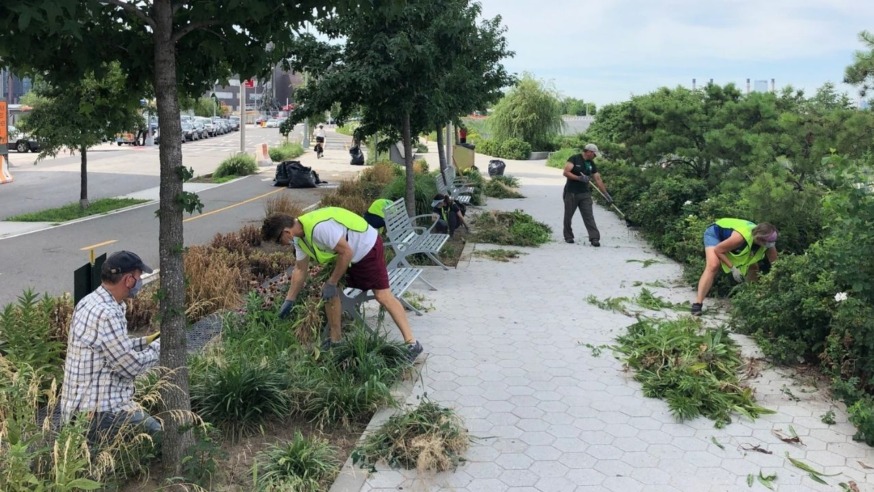
HPPC volunteers pulling weeds during a volunteer day (HPPC Facebook page).
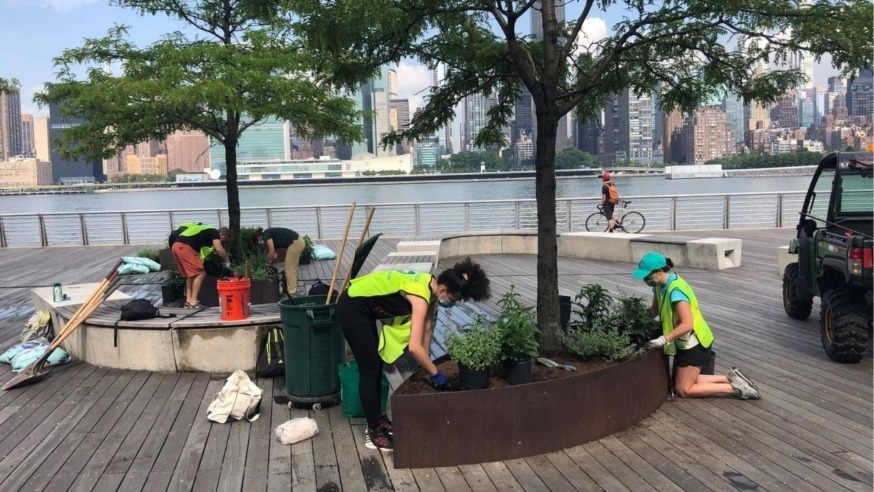
HPPC volunteers planting shrubs during a volunteer day (HPPC Facebook page).
